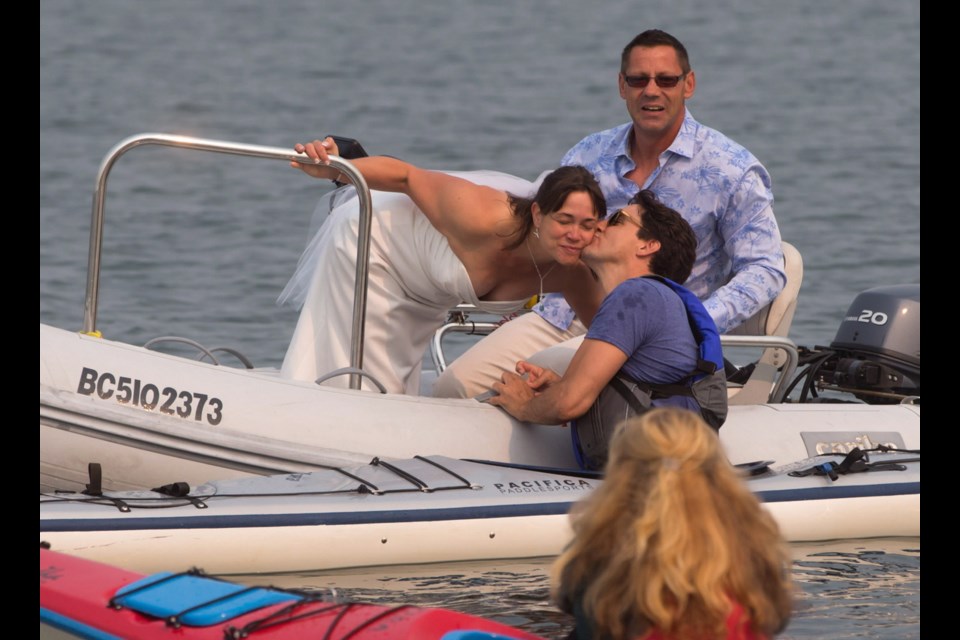Prime Minister Justin Trudeau and wife Sophie Grégoire Trudeau were kayaking along Sidney Spit on Saturday morning when a newlywed couple — the bride in her wedding dress — made a beeline toward them in an inflatable dinghy.
When Michelle and Heiner Gruetzner reached the Trudeaus, the prime minister promised not to take his shirt off — referencing a wedding he crashed last year in Tofino — and gave the bride two kisses on the cheek.
“It’s a good addition to the photo album, for sure,” Heiner Gruetzner said. The couple, who were married last week, were anchored off Sidney Spit for their reception when they heard the Trudeaus were out on the water.
“He’s a nice, down-to-earth person,” Michelle Gruetzner said. “I like that he connects with the people. And we got a chance to be part of that.”
The Trudeaus were at Gulf Islands National Park Reserve — largely for photo ops — between a Liberal dinner event in Victoria Friday night and an Indigenous roundtable in Tofino Saturday afternoon.
At Sidney Spit, Trudeau hugged a baby, high-fived a line of kids on the beach — and fell into the water while getting into his kayak.
“I’m just happy the national media was there to capture that,” he joked.
But it wasn’t all smiles and selfies. The prime minister also addressed local concerns about protection of the Salish Sea.
Conservationists have been calling for the waters to be protected for more than 40 years. The area in the southern Strait of Georgia is home to about 3,000 species, including the endangered southern resident killer whales. It also has some of the heaviest marine traffic on the coast.
While the federal government proposed a boundary for the national marine conservation area in 2011, conservationists such as the Canadian Parks and Wilderness Society have bemoaned the slow progress of official protection, which would ban activities like dumping and undersea mining.
Trudeau’s government has committed to protecting 10 per cent of the country’s coastline by 2020. The prime minister said the area would be a natural fit, but did not specify a date.
“We continue to work on it,” he said. “The commitments we’ve made as part of the international communities committing to protect marine areas is something we take seriously.”
At a beach-side news conference, Trudeau said he is deeply aware of the need to protect Canada’s West Coast waters from pollution threats, but also keenly attuned to the benefits of building a strong economy while respecting the environment.
The government has approved Kinder Morgan’s $7.4-billion Trans Mountain 1,150-kilometre pipeline expansion project from Alberta to B.C.’s coast.
The twin pipeline development will greatly increase Canada’s oil export capacity, but will also iincrease oil tanker traffic along the coast by sevenfold. Construction is set to begin next month.
“I have been out on these waters all my life, whether it was sailing off of English Bay … whether it was swimming out here at my aunt’s place near Brentwood Bay, and I have been a grandson of B.C. all my life and understand how important it is to protect these waters.”
Trudeau travelled to Tofino later Saturday to meet with Indigenous and regional leaders, discussing the environment, the economy and housing.
Chief Elmer Frank of the Tla-o-qui-aht First Nation said the relationship between his community and the federal government has improved since a dispute about commercial fishing rights led the chief to say the prime minister was no longer welcome on their territory.
“There’s been significant movement,” Frank said. “Not significant enough yet for a fisher to go out and make a tangible living, but it was significant enough for us to be able to demonstrate that there is some reconciliation hope.”
Trudeau acknowledged the progress, but said reaching a solution will take time.
“This process of reconciliation and building a future — and I understand your impatience that you wanted to get done overnight what took generations and centuries to go terribly wrong — is going to take more than a few months to get right,” he said.



